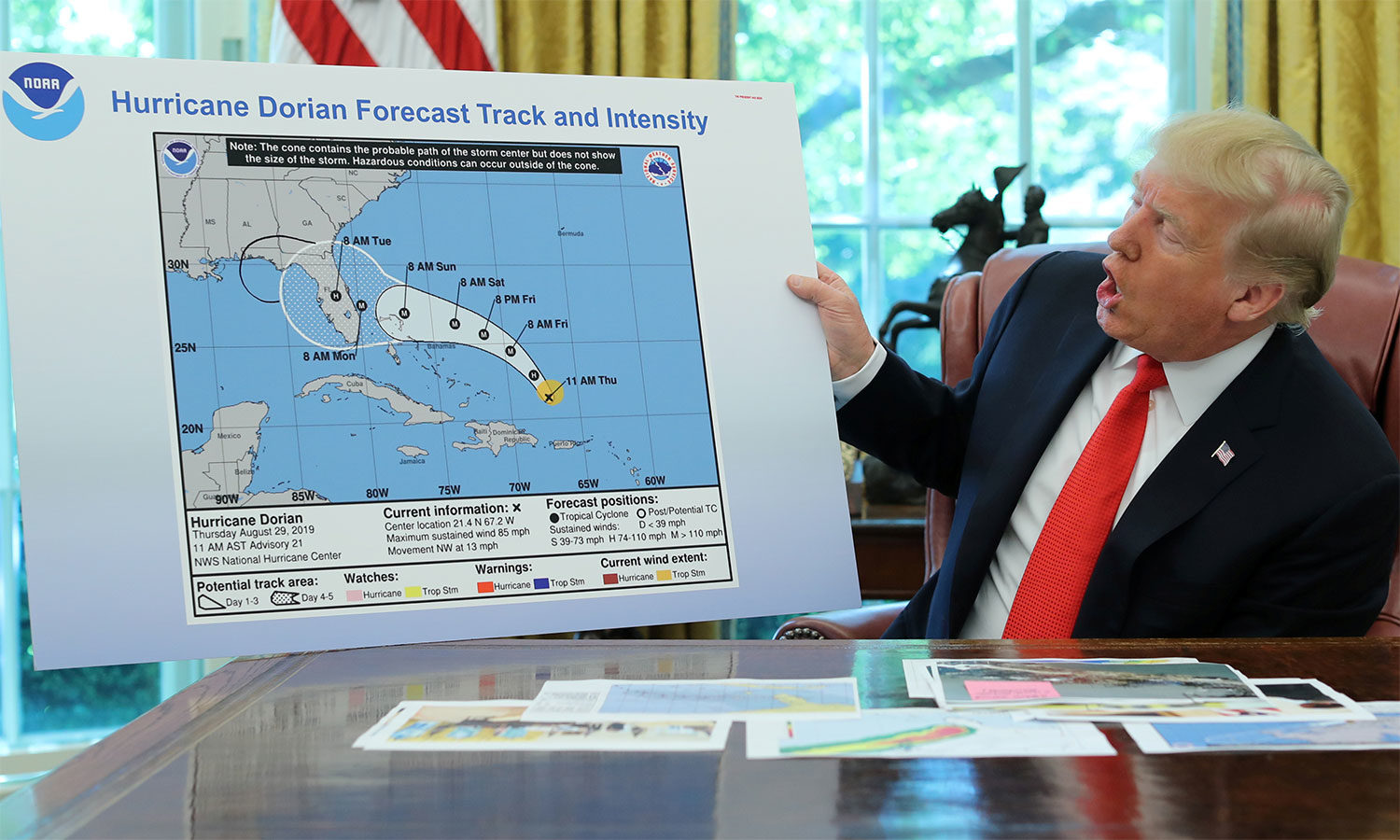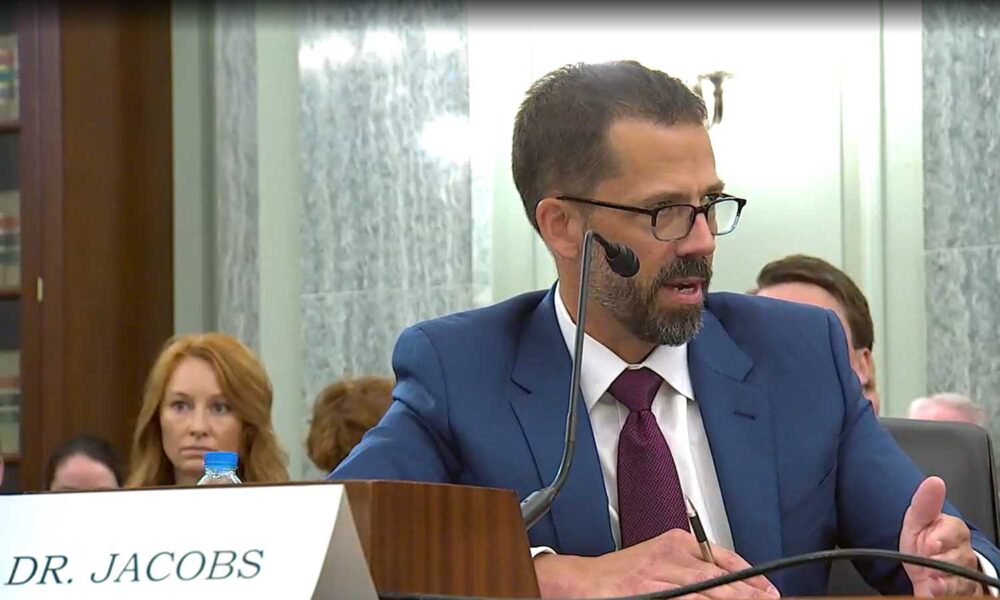Earlier this week, President Trump’s nominee to lead the National Oceanic and Atmospheric Administration (NOAA), Dr. Neil Jacobs, appeared before the US Senate Commerce, Science and Transportation Committee for his confirmation hearing. My colleague, Dr. Carlos Martinez, Senior Climate Scientist at UCS, followed the hearing closely and this blogpost captures some of his key takeaways.
Dr. Jacobs served as acting NOAA administrator during President Trump’s first term in office and was found to have contributed to politicizing the agency’s scientific work and to have violated its scientific integrity policy during the notorious “Sharpiegate” scandal. He deliberately allowed a false statement to be issued by NOAA, contradicting agency scientists’ forecasts about Hurricane Dorian’s projected trajectory, to provide political cover for an erroneous tweet from President Trump. So ahead of the hearing, there were already reasons to worry about his nomination.

In a UCS statement ahead of the hearing, Dr. Martinez said: “Despite his relevant expertise and career experience, Dr. Jacobs has already demonstrated he’s willing to undermine science and his employees for political purposes as he did during the infamous ‘Sharpiegate’ scandal. As NOAA administrator, Dr. Jacobs will bear responsibility for standing up to reckless Trump administration staffing and budget cuts that threaten NOAA’s mission. I worry about Dr. Jacobs’ ability to be the leader the country needs, especially as climate change is supercharging extreme weather across the United States.”
Dr. Martinez’s biggest concerns about what he heard at the hearing: Jacobs’ endorsement of the president’s destructive FY26 budget proposal for NOAA and his lukewarm comments on the science of human-caused climate change, which together did not instill confidence that he will be a stalwart defender of the agency, its scientific mission and staff experts.
NOAA—which is primarily tasked with gathering, sharing, and using the latest scientific data and analytic tools to understand and predict climate and extreme weather impacts—is facing insurmountable cuts to its budget and staffing with more expected. This data is widely used by weather forecasters, city and state planners, emergency responders, farmers, mariners, businesses and more. The recent flash flood tragedy in Texas brings to the fore the imperative to protect this robust scientific enterprise that taxpayers have invested in over decades to help keep people safe during extreme weather disasters.
Dr. Martinez watched the hearing, listening closely for how Dr. Jacobs intends to live up to the responsibilities of NOAA administrator at a time when the agency has been under unrelenting attack from the Trump administration. Commerce Secretary Lutnick, who oversees NOAA and will potentially be Jacobs future boss, has completely failed to do so.
Here are Dr. Martinez’s key takeaways from Jacobs Senate Confirmation Hearing:
- Despite acknowledging and expressing support for NOAA’s critical, life-saving work, Dr. Jacobs’ testimony is at odds with the FY2026 President’s Budget Request, which proposes a 27% cut to NOAA, cuts that he stated he supports.
- For example, he supports the collection of data from NOAA’s Regional Climate Data Centers, essential for forecasters and farmers, but the FY2026 President’s Budget Request would eliminate these centers entirely.
- He voiced support for continued research on harmful algal blooms and lake-effect snow, which informs freshwater ecosystems health and fisheries in the Great Lakes region, yet the FY2026 President’s Budget Request would terminate the Great Lakes Environmental Research Laboratory, the very lab conducting this work.
- He stated he supports upgrades to the National Weather Service radar network and hurricane aircraft, crucial for detection and forecasting of severe thunderstorms, and hurricane track and intensity. However, those efforts depend on foundational research conducted by NOAA’s Office of Oceanic and Atmospheric Research (OAR) like at the National Severe Storms Laboratory and the Atlantic Oceanic and Meteorological Laboratory, which is slated for termination under the proposed FY26 President’s budget request.
- While stating that climate is essential to NOAA’s mission, Dr. Jacobs made no mention of climate change or its role in supercharging extreme weather events. It was notably absent from his opening remarks. When directly asked, he provided a nuanced answer, acknowledging “human influence” but also emphasizing “natural signals”. Fact Check: natural signals or variability (e.g., volcanic eruptions, solar cycle) cannot account for the rapid rate of warming, it’s human activity spurred by fossil fuel emissions.
- He stated he would modernize NOAA weather radio systems, ensure NOAA emergency alerts, watches, and warnings are understood, and that Americans should not have to pay to access forecasting data and information.
- Lastly, he stated that he would not sign off on an inaccurate statement again (in response to a question about SharpieGate) and would improve morale at NOAA by appealing “to their sense of mission.” While it’s good to hear him say he won’t propagate false information, the fact that he is already caving in and providing cover for the president’s disastrous FY2026 budget isn’t a great sign that he will stand up to political pressure. As for his response on improving morale, it is frankly insulting to the thousands of people at NOAA who have been completely committed to the mission and yet have been undermined and mistreated by this anti-science administration.
Congress must ensure Dr. Jacobs is not rubber-stamped into his new position and that there continues to be oversight of his handling of his responsibilities if he gets the job. The nation depends on having a NOAA administrator who is firmly committed to advocating for a fully resourced agency, upholding its scientific integrity policy, halting the onslaught of attacks against NOAA and its staff, and guaranteeing that the agency’s widely used scientific data remains intact and publicly accessible.
Congress must also stand up to the Trump administration in the forthcoming annual budget appropriations process. It must absolutely reject the president’s destructive budget and instead ensure robust funding for NOAA so that it can deliver on its mission for all our benefit.

